Gas Connection in Dubai: Your Essential Guide
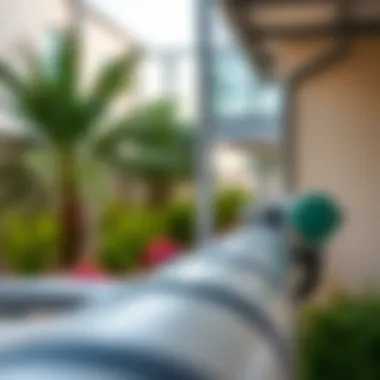
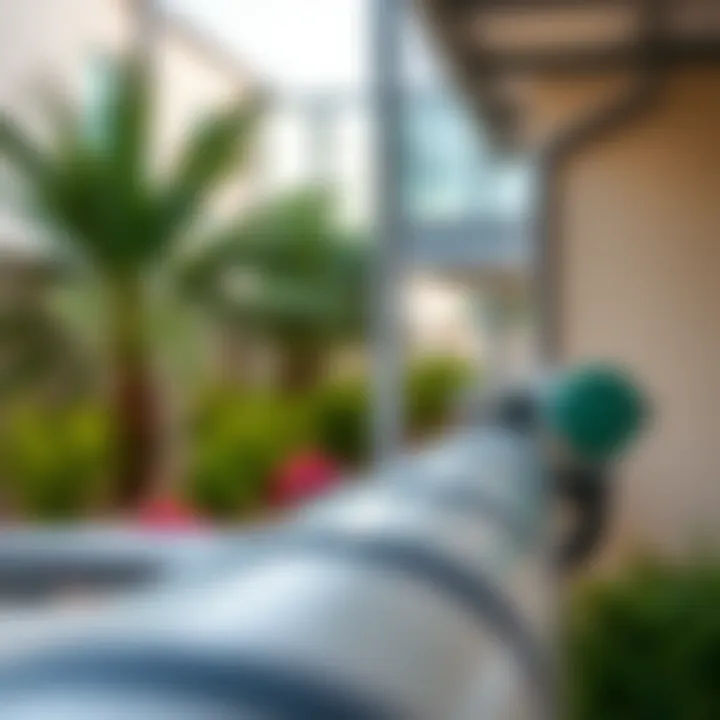
Intro
Setting the scene in Dubai, a city that never sleeps and where innovation meets tradition, the topic of establishing a gas connection merits significant discussion. The gas connection process is not merely a technical formality; it is a vital element for homeowners and investors aiming to tap into the potential of the real estate market. In a region known for its arid climate and reliance on energy for both domestic use and commercial activities, understanding the gas connection dynamics is crucial.
Here we will untangle the regulatory framework surrounding gas connections, examine the infusion of safety measures integral to the installation process, and highlight the essential steps that homeowners and real estate professionals must navigate. The narrative unfolds into the larger context of how natural gas energy is revolutionizing this bustling metropolis, contributing to its growing economic landscape.
Whether you are a first-time homebuyer, an investor scouting for the next big opportunity, or a seasoned property manager, the insights laid out here will serve as a roadmap to understanding the nuances of gas connections in Dubai. In a place where the skyline is only outdone by the ambition of its citizens, being knowledgeable about such topics can and will make a difference in your journey.
Prelude to Gas Connection in Dubai
In the bustling metropolis of Dubai, establishing a gas connection is not merely a technical requirement; it represents a pivotal component of modern urban living. The significance of gas connections extends beyond the realm of heating and cooking; they are interwoven with economic, environmental, and societal facets of daily life.
Importance of Gas Connections in Urban Living
Gas connections play an essential role in the urban fabric of Dubai. As the city continues to grow, providing reliable energy sources becomes ever more crucial. Here are several key benefits that underscore this importance:
- Reliability: Natural gas is often more reliable than other energy sources. It ensures consistent service, which is vital for businesses and households alike.
- Efficiency: The infrastructure for gas distribution supports efficient energy use, optimal for a city that prides itself on sustainability and low carbon emissions.
- Cost-effectiveness: Typically, gas is considered more affordable when compared with electricity in terms of heating and cooking. This aspect is especially appealing to homeowners and renters trying to manage their budgets in an ever-expanding city.
Furthermore, gas connections also help in diversifying energy sources, reducing dependency on a single power grid, and enhancing energy security.
Overview of Dubai's Energy Landscape
Dubai's energy landscape is fascinating and continually evolving. The city has positioned itself as a hub for energy innovation, aiming to balance its rapid expansion with sustainable practices.
- Diverse Energy Sources: While natural gas remains a cornerstone, Dubai is also exploring solar energy, nuclear power, and even waste-to-energy projects as part of its broader strategy to diversify.
- Government Initiatives: The Dubai Clean Energy Strategy 2050 aims to transform Dubai into a global center for clean energy and green economy, significantly impacting how gas connections are viewed and utilized in residential and commercial spaces.
- Regulatory Oversight: The regulatory framework that governs gas connections reflects the city’s commitment to safety and efficiency. Bodies such as the Dubai Supply Authority ensure that standards are met, providing an extra layer of confidence for residents.
Understanding these dynamics is imperative for anyone considering a gas connection in Dubai, be it potential homeowners, investors, or property managers. With this knowledge, prospective clients can make informed decisions while aligning with Dubai's energy vision.
"Investing in gas connection today not only meets immediate needs but also aligns individuals with Dubai's sustainable future."
Regulatory Environment for Gas Connections
The regulatory environment for gas connections in Dubai is a crucial framework that governs the safe, efficient, and sustainable delivery of gas services to both residential and commercial properties. Understanding this framework is vital for investors, homeowners, and property managers alike, as it shapes everything from application processes to compliance requirements.
A dense network of regulations not only ensures safety but also manages the balance between increasing demand and environmental protection. With the city's rapid growth, adhering to these regulations is not just a legal obligation but also a proactive measure for long-term investment security.
Key Regulatory Bodies
In Dubai, several key regulatory bodies oversee the gas industry, ensuring that standards are met and practices are followed. Here are the major players:
- Dubai Regulatory and Supervisory Bureau (RSB): This agency is responsible for overseeing the regulation of the gas supply chain, ensuring compliance with safety and quality standards.
- Dubai Electricity and Water Authority (DEWA): While DEWA primarily deals with electricity and water, they have significant influence over gas supply and are integral in public discussions about energy use and policies.
- Emirates Authority for Standardization and Metrology (ESMA): This authority provides guidelines on standards to be followed for gas installations, contributing to both safety and efficiency.
These organizations work collaboratively to ensure the gas distribution system is robust and reliable. They not only facilitate the setup of new connections but also monitor existing services to ensure they align with current laws and standards.
Permits and Licenses Needed
Before establishing a gas connection in Dubai, several permits and licenses need to be obtained. This step is non-negotiable and ensures that everything is done legally and safely. The process generally includes:
- Application for Approval: Prospective users must submit an application to the fitting regulatory authority, detailing their intended use and specific needs.
- Technical Assessment: Once the application is received, a technical assessment is conducted to determine suitability for connection. This may involve site visits and inspections by professionals.
- Gas Connection Agreement: After approval, a formal agreement defining the terms of service must be signed by both the provider and the consumer.
- Installation Certification: Post-installation, an inspection by authorized bodies verifies compliance with relevant standards, ensuring safety before the service can commence.
Having these permits not only avoids legal complications but also safeguards lives, making the investment in gas a controlled, safe process.
"Compliance with regulatory standards is not just a checkbox; it’s a commitment to safety and environmental stewardship."
In summary, the regulatory environment surrounding gas connections in Dubai isn't merely a bureaucratic hurdle but a vital aspect of ensuring the safety of citizens and the integrity of the city’s energy infrastructure.
Types of Gas Connections Available
Understanding the different types of gas connections is vital for homeowners and business operators in Dubai. The benefit of tailoring gas supply to specific needs can’t be overlooked. With an ever-growing real estate market and bustling commercial landscape, having the right type of gas connection plays a key role in operational efficiency and safety for both residential and commercial entities.
In Dubai, the most common types of gas connections are divided into residential and commercial categories. Each type serves distinct purposes, and their differences matter greatly when considering factors like consumption patterns, safety regulations, and installation procedures.
Residential Gas Connections
For households in Dubai, establishing a gas connection is often about making daily life conveniences possible. These connections cater to the average home’s energy requirements, supporting appliances such as stoves, water heaters, and dryers. The process of obtaining such a connection typically involves several steps.
- Application Submission: Homeowners must first apply to a gas supplier. This application will require documentation such as proof of identity and property ownership.
- Site Inspection: Following a successful application, a site inspection is typically performed to assess installation requirements. This assessment is crucial for ensuring safety and compliance.
- Installation: After inspections, connection installation is executed, adhering strictly to local regulations.
- Meter Installation: A gas meter will be set up to monitor consumption, ensuring you're charged appropriately.
"Connecting to gas not only enhances the comfort of your home but also has implications for long-term sustainability."
With gas prices trending differently based on the market, understanding usage patterns helps in making informed decisions, especially when it comes to budgeting for utility costs. Homeowners should also consider maintaining their appliances regularly to avoid hazards and ensure efficiency.
Commercial Gas Connections
On the commercial front, gas connections are essential for businesses ranging from restaurants to laundries, where large volumes of gas are needed for operations. Here, the stakes and complexities increase significantly due to the demands of high usage and safety.
- Comprehensive Demand Assessment: Businesses must conduct a thorough assessment of their gas needs. This often involves financial forecasting related to energy costs.
- Compliance with Regulations: Commercial connections must strictly follow guidelines set by regulatory bodies, which may differ from residential protocols. Failure to comply can lead to penalties or disconnection.
- Installation by Professionals: Specialized contractors typically handle installations in commercial settings, ensuring that connections meet safety standards and are suitable for high-load operations.
- Monitoring and Maintenance Contracts: Ongoing contracts for monitoring and maintenance help prevent outages and ensure that all safety standards are upheld.
The presence of a reliable gas connection is crucial in high-stakes environments, as it can directly influence a business's profitability. A malfunction can translate into significant downtime, impacting customer satisfaction and ultimately, the bottom line.
Process of Setting Up a Gas Connection
Setting up a gas connection in Dubai isn't just about having the right pipes and appliances; it involves a series of thoughtful steps that ensure safety, efficiency, and compliance with local regulations. The dusk-to-dawn nature of life in a dynamic city like Dubai means that energy consumption is critical. Fire up your cooking, heating, or hot water systems with the comfort knowing you've taken the right steps to connect to this essential utility. This section dives deep into what the entire process looks like, from application to actual installation.
Application Procedure
The journey towards establishing a gas connection begins with the application process. This might feel tedious, but every step is designed to safeguard not only the homeowner but the entire community. Here's how it typically unfolds:
- Gather Required Documentation: Before you even think about submitting that application, gather essential documents. You’ll need identification, proof of property ownership, and any previous utility statements, if applicable.
- Submit an Application: Applications can be submitted through your chosen gas provider's website or physical office. Depending on the provider, there might be a specific format to follow, so don’t skip the fine print!
- Wait for Processing: Once submitted, your application goes through a verification process. This can take anywhere from a few days to several weeks, depending on the backlog at the provider’s office.
- Site Assessment: After approval, a technician will schedule a site visit to assess the layout and readiness of your property. They examine everything from the structural integrity of your building to existing utilities.
- Approval Confirmation: Upon completing the site assessment, you’ll receive a confirmation of approval, stating what’s required to proceed with installation.
The clarity of this application process is a boon to homeowners, as it delineates every required action. Remember, this isn’t just a box-ticking exercise; understanding the stakes involved is essential.
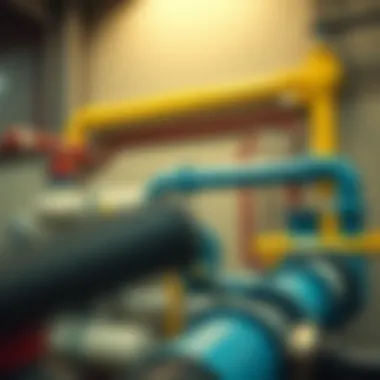
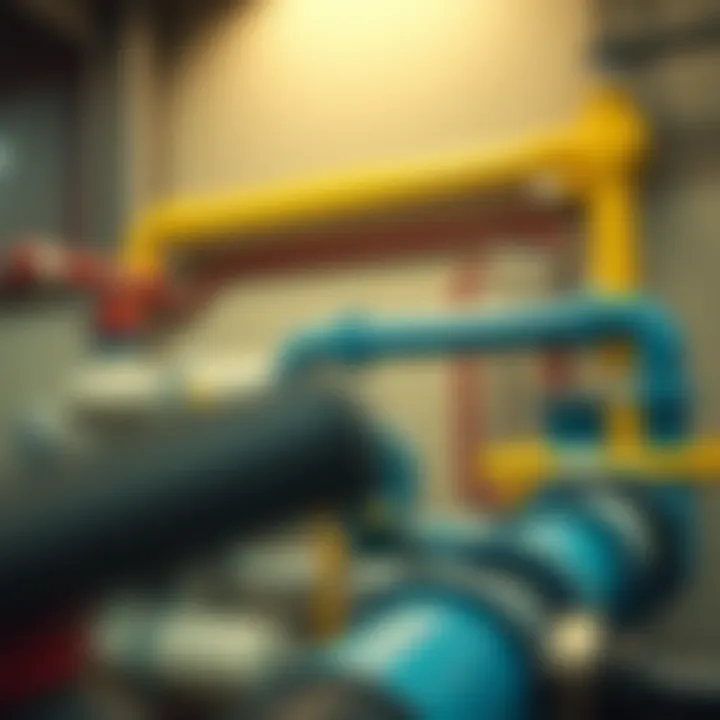
Installation Timeline
Once your application passes the critical checkpoints, the timeline for installation can begin to take shape. The implementation process generally looks something like this:
- Scheduling Installation: Upon receiving your approval, you’ll work with the provider to schedule a suitable time for installation. This usually happens within 2-4 weeks, though during peak seasons it might slightly vary.
- Installation Day: On the day of installation, expect a crew of trained professionals. They will handle everything from laying the gas lines to connecting your appliances. Depending on the complexity and size of your project, this operation could last anywhere from a few hours to an entire day.
- Final Checks and Testing: After installation, there are a series of safety checks and pressure testing to ensure everything is in order. Only once these checks are passed will you be told that your system is safe for use.
- Connection Activation: The final step is the activation of your gas connection, typically performed by a technician. It’s crucial this part is executed correctly, as any oversight can lead to safety hazards.
In short, the installation timeline can span anywhere from a few weeks to over a month, shaped by the complexity of your property and the responsiveness of your provider.
Connecting to natural gas not only fuels your home but feeds into the larger narrative of Dubai’s energy strategy.
In summary, while setting up a gas connection in Dubai is an undertaking that requires attention to detail, the process is decidedly structured and designed to facilitate a smooth transition to gas energy. Homeowners and property managers alike should be prepared, informed, and thorough to make the most of their gas connection journey.
Key Considerations Before Establishing a Connection
Before diving headfirst into the establishment of a gas connection in Dubai, it’s crucial to pause and reflect on several key considerations that can significantly impact your experience and operational efficiency. This section will shed light on the essential elements you must evaluate. It also emphasizes how a well-thought-out approach can yield multiple benefits, smooth the installation process, and avoid potential pitfalls.
Assessing Your Energy Needs
Understanding your energy requirements is the first step in this endeavor. Every household or business will have unique demands based on their usage patterns.
- Daily Consumption: Gauge how much gas you anticipate needing daily. Are you powering appliances and heating systems continuously, or will your usage be intermittent? Conducting an energy audit can greatly assist in this assessment.
- Appliance Requirements: Take stock of all gas appliances you plan to use. Different appliances have varying specifications and energy needs, which can affect the size and type of gas connection you require. For instance, a high-efficiency gas heater will naturally necessitate a different setup compared to a basic stovetop.
- Future Growth: Consider any future changes. Are you planning to expand your property or add more gas-consuming appliances? Factoring in growth can save you from future headaches.
By focusing on these dynamics, you align your gas connection setup closely with your actual needs, creating an efficient, cost-effective, and less burdensome system.
Cost Implications
Cost plays a significant role when setting up a gas connection, and it entails more than just the installation fees. Here are several elements to keep in mind regarding costs:
- Installation Costs: Initial setup can vary widely depending on the complexity of the installation. A straightforward connection may cost significantly less than a more intricate system involving multiple gas outlets or extensive piping.
- Monthly Bills: Factor in the ongoing consumption costs based on your anticipated usage and the rate structure provided by your gas supplier. Understanding this will help create a realistic budget.
- Compliance Costs: Make sure to account for any necessary permits or licenses, which may have associated fees. These are critical for ensuring your connection is lawful and can sometimes be overlooked.
- Maintenance Expenses: Regular upkeep can also add up. Allocate funds for periodic checks and servicing of your gas appliances to ensure efficiency and safety.
Understanding these cost implications can prevent unpleasant surprises down the road. Remember, it’s more than just an upfront investment; it’s a continual commitment to financial diligence.
Safety Protocols in Gas Connections
In any modern urban environment, safety protocols related to gas connections are paramount. Particularly in a bustling city like Dubai, where the rise of residential and commercial complexes is as fast as the desert sun sets, having a robust safety framework in place ensures that residents and businesses can use gas services without fear. The importance of these protocols can't be overstated; they provide a fundamental layer of security in both everyday use and emergency situations.
Safety Standards and Guidelines
Gas safety standards and guidelines aim to protect users from potential hazards associated with domestic and commercial gas services. These protocols typically stem from international best practices and are tailored to meet the specific needs of Dubai’s unique landscape.
- Regulatory Compliance: Adhering to safety standards ensures compliance with local regulations, which is enforced by authorities such as the Dubai Supply Authority. This means that companies involved in the gas supply must meet strict criteria before they can offer services.
- Installation Regulations: The guidelines dictate that gas installations should be done by certified professionals. This helps avoid potential hazards that could arise from incorrect installations.
- Routine Inspections: Regular checks and maintenance of gas lines and appliances limit the risk of leaks. Not only do these inspections help in identifying weaknesses in the system, they also ensure that all components are functioning effectively.
- User Education: Educating users on safe gas practices plays a significant role. Residents should know how to recognize signs of gas leaks, the proper way to operate gas appliances, and the importance of ventilating spaces.
The combination of these elements creates a solid foundation for safety management in gas connections. The aim is to successfully prevent accidents that can have dire consequences.
Emergency Procedures
Despite all precautions, emergencies can still occur. Hence, having established emergency procedures is crucial for mitigating risks and ensuring quick response to incidents involving gas connections.
- Identification of Leaks: Users must be trained to sniff out indicators of a leak, such as a distinct sulfur-like smell, and know that they should immediately evacuate the area.
- Emergency Contact Numbers: Keeping a list of emergency contacts visible and easily accessible is vital. In Dubai, the Dubai Civil Defence hotline is a crucial resource in moments of crisis. Residents should familiarize themselves with these details.
- Shutting Off Gas Supply: Understanding how to turn off the main gas supply valve can be a lifesaver. Knowing this process, and having the tools readily available, gives individuals the power to take control in a gas emergency.
Always remember that safety begins at home. Regular checks, understanding the systems in place, and knowing how to act in emergencies can save lives.
To enhance safety further, residents and businesses should take part in community training programs focused on gas safety, often organized by local authorities or gas suppliers. These workshops play a crucial part in promoting safety awareness.
In summary, gas connection safety protocols in Dubai weave together compliance, education, inspection, and preparedness. By respecting these elements, both homeowners and commercial enterprises can benefit from a reliable gas service while significantly reducing the risks associated with gas usage.
Environmental Impact of Gas Systems
Understanding the environmental impact of gas systems is crucial. As cities become more urbanized, how energy is sourced and utilized can lead to significant changes in air quality, energy consumption, and even climate change factors. Gas connections in Dubai, in particular, deserve a thoughtful examination due to the city's rapid growth and increasing energy needs.
Natural Gas vs. Alternative Fuels
When discussing gas connections in Dubai, one can't ignore the debate surrounding natural gas and alternative fuels. Natural gas, often touted as a cleaner fossil fuel, produces fewer carbon emissions compared to coal and oil. However, it’s essential to recognize that it is still a hydrocarbon-based fuel, meaning that its use is not without environmental concerns.
- Efficiency and Emissions: Natural gas burns more cleanly than other fossil fuels, reducing CO2 emissions during combustion. According to various studies, switching from coal to natural gas can reduce emissions by 50%.
- Methane Concerns: Methane, which is a significant component of natural gas, has a much higher global warming potential than CO2. If benefits from burning natural gas are to be maximized, this leak is critical to monitor and minimize.
- Alternative Solutions: Alternatives like solar and wind energy are more sustainable long-term options. These renewable sources don't emit greenhouse gases during operation and are becoming more viable as technology progresses.
However, making a complete switch might not be feasible in the short term. For many businesses and homeowners in Dubai, the limited infrastructure for alternative fuels adds to the argument favoring the continuation of natural gas systems, at least in the interim.
Sustainability Measures in Dubai
Dubai has undertaken numerous sustainability measures in response to its growing environmental challenges. The emergence of initiatives focuses on reducing the carbon footprint associated with natural gas usage.
- Energy Efficiency Programs: The Dubai Electricity and Water Authority (DEWA) offers programs aimed at increasing energy efficiency for gas appliances, encouraging residents to upgrade to more efficient models. This initiative helps offset some emissions from existing gas usage.
- Green Building Standards: Dubai has implemented strict regulations on new buildings to align with sustainability practices. This includes the incorporation of energy-efficient technologies that work alongside gas systems, drastically reducing their overall environmental impact.
- Research and Development: Continuous investment in research surrounding carbon capture and storage technologies aims to mitigate the emissions produced from natural gas usage. This provides a proactive approach toward enhancing the sustainability of gas systems.
The interplay between natural gas and sustainable alternatives will dictate the future energy landscape of Dubai. The city’s efforts towards reducing energy-related emissions are commendable, yet much remains to be tackled.
Future Trends in Gas Connectivity
In the bustling urban landscape of Dubai, the future of gas connectivity is not just a matter of convenience but a critical aspect that influences economic growth, environmental sustainability, and technological progress. As the demand for energy escalates with the city's rapid expansion, understanding these trends becomes imperative for homebuyers, investors, and stakeholders in the energy sector.
Advancements in Technology
The gas sector is undergoing a remarkable transformation driven by technological advancements. Innovations like smart meter systems are enabling real-time monitoring of gas usage, optimizing efficiency while drastically reducing wastage. By integrating Internet of Things (IoT) capabilities, these technologies allow providers to remotely diagnose issues and enhance customer service.
Moreover, automation in the installation processes is a handle on reducing labor costs and time. Drones are now being experimented with for pipeline inspections, ensuring safety standards are met without significant human intervention. This not only minimizes risks to personnel but also expedites the maintenance and monitoring of gas infrastructure.
In short, the future is leaning heavily on tech trends that empower consumers and providers alike. These advancements ensure not just reliability but also provide valuable data that can improve future project planning and resource allocation.
Predicted Changes in Demand
As Dubai continues to grow, so does its appetite for energy. The anticipated diversification of the economy, particularly towards renewable energy sources, will influence the gas market significantly. Predictions indicate a shift in consumer preferences, where more homeowners will seek environmentally friendly solutions that align with the city’s ambitious sustainability goals.
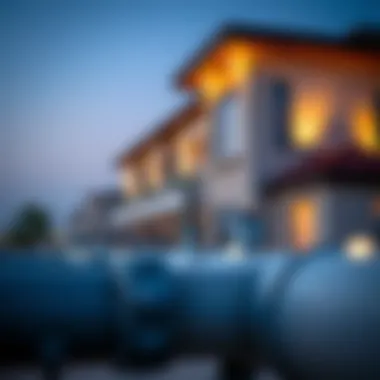
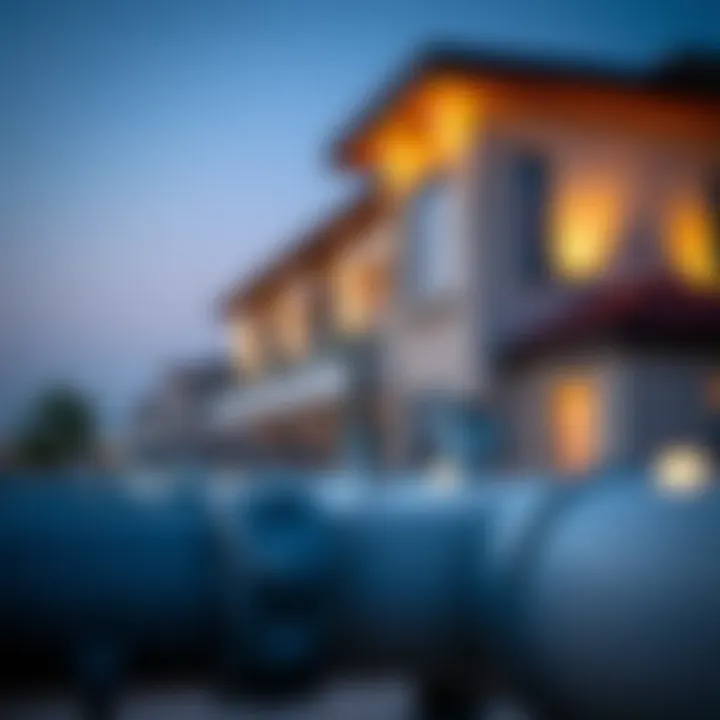
Factors affecting this increasing demand include:
- Population Growth: As new residents move into the city, the demand for residential gas connections for cooking and heating will rise.
- Commercial Development: With Dubai attracting numerous businesses, more commercial ventures will need gas for operations, further driving demand.
- Government Initiatives: Programs promoting natural gas as a cleaner alternative to other fossil fuels will make it an attractive option for consumers.
Thus, businesses and homeowners will find themselves navigating a marketplace that is dynamic and increasingly inclined towards sustainability. Understanding these shifts will be key for anyone looking to capitalize on the evolving gas connectivity landscape.
"Anticipating future energy demands is crucial for anyone engaged in Dubai's gas market. It’s not just about meeting current needs but being proactive about future challenges and opportunities."
By preparing for these trends, potential investors and stakeholders can stay ahead of the pack, making informed decisions that contribute positively to Dubai's energy future.
Case Studies on Gas Connection Projects
Importance of Case Studies in Analyzing Gas Connections
Understanding gas connection projects through case studies is akin to looking through a keyhole into the mechanics of Dubai's energy landscape. These real-world examples shed light on the practicalities of gas integration, demonstrating not only the effectiveness of existing setups but also the challenges and lessons learned along the way. Each case study serves as a roadmap for stakeholders, offering insights that are invaluable for both seasoned investors and those new to the field.
For investors and property managers, these case studies highlight specific actions that lead to successful implementations, as well as pointing out pitfalls that one might want to avoid. They underline the importance of a tailored approach to gas connections, where the needs of residential and commercial projects can differ significantly. By studying these past initiatives, professionals can better understand market drives, zoning issues, and client expectations in the dynamic environment of Dubai.
Residential Projects
One shining example of gas connection implementation in residential properties can be found in the Al Barsha district. Here, a series of townhouses have been upgraded to leverage natural gas, which has not only enhanced the convenience for residents but also reduced their energy costs. The project involved a collaboration between local utility providers and property developers to ensure compliance with safety regulations and meet energy demands effectively.
Benefits Highlights
- Cost Efficiency: Homeowners have reported savings of up to 30% on energy bills compared to traditional electricity.
- Enhanced Value: Properties equipped with gas connections are now seen as more desirable in the real estate market.
- Convenience: Residents enjoy a seamless gas supply for cooking and other heating needs, which outweigh the hassle of electric appliances.
Challenges Encountered
Despite the numerous benefits, this residential project faced hurdles, notably in obtaining the necessary permits, which delayed the installation phase. Additionally, some homeowners were initially hesitant to switch due to misgivings about safety. These considerations serve as a reminder that community education is crucial in easing apprehensions and ensuring a smooth transition.
Commercial Ventures
In the realm of commercial developments, the integration of gas connections is particularly evident in the Dubai Marina area, where several restaurants and cafes have opted for natural gas systems. Take, for instance, the bustling eatery "Seafood Haven," which revamped its kitchen to operate entirely on gas. This shift not only boosted the efficiency of cooking but also improved the overall dining experience, as gas allows for precise temperature control in a high-demand environment.
Project Benefits
- Operational Efficiency: Businesses enjoy faster cooking times and increased food quality, which is vital in a competitive market.
- Sustainability Impact: By switching to gas, these establishments have significantly lowered their carbon footprints compared to using electricity derived from fossil fuels.
- Reliability: Natural gas systems are often more reliable during peak hours, helping businesses avoid interruptions and maintain steady service.
Insights from Challenges
Commercial projects, however, are not without their challenges. The coordination between various contractors and the gas supplier was less smooth than anticipated, causing some delays in project rollouts. Additionally, restaurants had to navigate the complexities of ongoing maintenance, as failure to regularly service gas equipment can lead to safety concerns.
Overall, examining these residential and commercial gas connection case studies presents a microcosm of broader strategies available to navigate Dubai’s rising energy needs. The lessons learned here serve as essential guidance for future endeavors, ensuring investors are both well-informed and prepared to tackle similar initiation processes.
Comparative Analysis of Providers
When considering a gas connection in Dubai, one of the most critical steps is performing a comparative analysis of the various gas providers. This analysis can greatly impact your experience, from service reliability to cost efficiency. With a range of companies operating in the field, understanding your options enables investors, homebuyers, and property managers to make informed decisions, ultimately saving time and money.
Major Gas Suppliers in Dubai
Dubai is home to several prominent gas suppliers, each with distinct advantages and service offerings. The two main players in the market are:
- Dubai Natural Gas Company (DUGAS)
- Emirates Gas LLC
Each of these companies has established a reputation for delivering reliable gas services to both residential and commercial customers.
- Dubai Natural Gas Company (DUGAS) specializes in providing natural gas to domestic sectors as well as corporate clients. Their services include installation, maintenance, and emergency response. DUGAS operates with a focus on customer satisfaction and safety, which are vital in the gas supply sector.
- Emirates Gas LLC is part of the Emirates National Oil Company (ENOC) and has a robust distribution network. They offer a wide array of services, including bottled gas supply for smaller properties, making it suitable for both large and small-scale projects.
An important factor to consider when evaluating these providers is their response times for emergencies. Fast response is essential in the gas industry, not just for regulatory compliance, but for ensuring the safety and assurance of customers.
Service Plans and Pricing
Understanding the service plans and pricing structures is essential for homeowners and property managers alike. Each provider varies in their rates and offerings, making it advisable to obtain detailed quotes covering:
- Installation Fees
- Monthly Service Charges
- Emergency Response Fees
- Long-term Contract Discounts
For example, while DUGAS may offer a competitive monthly service charge, their installation fees could be higher than that of Emirates Gas which might have discount options for long-term clients.
Additionally, promotional offers may be available, so it’s worth checking periodically or discussing this with customer service representatives. Comparing these factors can help you choose a plan that aligns best with your budget and service requirements. Remember, while low prices appeal at first, the overall value derived from reliability and customer service often outweighs minor cost differences.
"In an industry as crucial as gas supply, the combination of safety, reliability, and cost-effectiveness should dictate your choice of provider."
Homeowner Responsibilities
Understanding homeowner responsibilities in regards to gas connections is vital for ensuring safety and efficiency within urban living environments. Homeowners play a key role in managing their gas systems effectively, ultimately safeguarding their properties and the well-being of their families. Ignorance of one’s duties can lead not just to safety risks, but also to legal issues and unnecessary expenses.
Maintaining Gas Appliances
When it comes to maintaining gas appliances, diligence is key. Regular maintenance checks of devices such as gas stoves, heaters, and boilers can prevent potential hazards such as gas leaks or fire hazards. For instance, keeping burners clean ensures efficient operation and reduces the risk of incomplete combustion, which can produce dangerous carbon monoxide.
- Schedule routine inspections: It is a good practice to arrange professional inspections at least once a year. Technicians can identify wear and tear that the average homeowner might overlook.
- Keep ventilation clear: Ensure that vents and ducts for gas appliances are not blocked. This helps in preventing gas buildup and promotes proper combustion of gas.
- Be mindful of odors: If there is a smell of gas, it’s crucial to address it immediately. Open windows, evacuate the area, and contact your gas provider or emergency services without delay.
By keeping appliances in top condition, homeowners not only ensure safety but also contribute to the longevity and performance of their gas systems.
Ensuring Compliance with Regulations
Regulatory compliance is another critical aspect of homeowner responsibilities. Different regulations exist related to gas installations, and adhering to them is non-negotiable. This includes complying with local authority regulations and national safety standards, which help in avoiding legal penalties while protecting lives and property.
Key points for compliance include:
- Understanding local regulations: Homeowners must familiarize themselves with regulations set by the Dubai Supreme Council of Energy and other governing bodies. Ignorance does not exempt one from liability.
- Obtain necessary permits: Before any installation or major alteration, homeowners should ensure that all permits are in place. Non-compliance can lead to costly fines.
- Install appliances by licensed professionals: Using licensed contractors not only guarantees quality work but also ensures adherence to safety norms. Always verify credentials before hiring.


Compliance is not just about following rules; it's about safeguarding lives and preventing disasters.
Adhering to these homeowner responsibilities not only ensures personal safety but also contributes to the overall efficiency of Dubai's gas services. Taking proactive steps in maintaining gas appliances and ensuring compliance can save significant time, money, and stress in the long run.
Industry Insights from Experts
In the fast-paced world of energy distribution, especially in a thriving metropolis like Dubai, insights from those who live and breathe the industry offer invaluable perspectives. This section highlights the significance of tapping into professional experience in understanding the intricacies of gas connections.
Industry expert opinions shed light on various aspects, including the technical standards required for safe and efficient gas systems, emerging trends in natural gas utilization, and the competitive landscape among suppliers. Engaging with professionals provides homeowners, investors, and property managers with practical knowledge that can guide critical decision-making.
The dynamism of the market, combined with the regulatory framework in Dubai, creates a unique environment that influences how gas is supplied and consumed. Here are some key benefits of seeking insights from industry experts:
- Understanding Safety Protocols: Experts can provide clarity on the latest safety regulations governing gas installations, ensuring compliance and reducing risks.
- Navigating Regulatory Changes: With a landscape that can change as quickly as the city itself, insights help stakeholders stay ahead of new policies and standards imposed by local authorities.
- Choosing the Right Supplier: In a competitive market, expert guidance can help in identifying reliable suppliers with the best service plans and pricing structures.
“The voice of the industry is crucial for anyone looking to connect their homes or businesses to the gas network. It’s like having your own GPS in a city where every turn is important.” - A seasoned gas supply technician.
By engaging with experts through interviews and discussions, stakeholders not only access information but can also build networks that could prove beneficial in future endeavors.
Interviews with Gas Supply Professionals
Securing a direct line of communication with gas supply professionals can be a game-changer for anyone considering establishing a gas connection. These individuals are not just skilled technicians but seasoned veterans who have witnessed the evolution of the gas sector first-hand.
Generally, interviews with these professionals reveal many practical aspects of the gas connection process, like:
- Installation Nuances: Each project comes with its own set of challenges. Experienced professionals share stories from the field, revealing common pitfalls to avoid during setup.
- Service Expectations: Insights into how various gas supply companies manage customer service and what clients should expect throughout the installation and maintenance processes.
Moreover, having these conversations helps demystify the technical jargon often associated with gas distribution, empowering homeowners and investors with clearer expectations.
Expert Opinions on Market Trends
The gas market is continually evolving, particularly in a rapidly developing city like Dubai. Expert opinions on these market trends can offer predictive insights that are vital for stakeholders. Several key factors are shaping the future of gas connections in the region:
- Increasing Demand for Cleaner Energy: A gradual shift towards greener energy solutions is expected and gas suppliers are adapting, which could fundamentally affect how connections are set up in the future.
- Technological Advancements: Innovations such as smart meters and enhanced pipeline monitoring systems are making gas consumption safer and more efficient, a topic often discussed among industry professionals.
Understanding these market trends and technological shifts equips investors and homeowners with the necessary insights to make informed decisions, ensuring that their gas connection aligns with future developments in the energy sector.
For those looking for more thorough insights, resources like Wikipedia provide a wealth of information about natural gas as a resource and its implications for urban living.
Resources for Further Learning
Understanding gas connections in Dubai isn't just about the technicalities; it's also about having a pool of resources that can guide one through the complexities. For homeowners, investors, and property managers, grasping the fundamental concepts can make all the difference between a sound decision and a costly mistake. Resources for further learning provide pathways to in-depth knowledge, keeping one informed about changing regulations, innovations, and best practices.
One crucial aspect of these resources is their ability to keep you updated. The gas sector is ever-evolving, and having access to the latest information can aid in making informed decisions. Niche online platforms often feature articles or forums where issues related to gas supply and installation are discussed – perfect for investors looking to maximize their energy costs while maintaining safety standards.
In addition, networking with professionals in the field through reading materials can open doors to opportunities that are not widely reported. When engaging with well-rounded literature, one is more equipped to grasp the implications of new technologies and government legislations. This can be particularly relevant during economic shifts or regulatory reforms, which might impact the gas supply.
Recommended Reading Materials
- "Natural Gas Infrastructure in the UAE": A deep dive into how the UAE's natural gas infrastructure supports local and regional needs. Available at britannica.com.
- "Energy Strategies for Sustainable Development": This book covers various energy strategies that align with sustainability, including natural gas. It provides insights that could be valuable for future investments.
- "Gas Safety and Compliance Guidelines": Essential reading for homeowners to ensure safety and conformity with regulations.
- "Dubai's Energy Landscape – Trends and Insights": A report that reframes the conversation around energy sources in Dubai, pointing towards future trends and market dynamics.
- Technical Standards in Gas Supply: Found via governmental websites, these documents offer crucial guidelines on safety and operational standards.
Online Resources and Databases
- Dubai Electricity and Water Authority (DEWA): Their website is a goldmine of information on energy services, safety guidelines, and more, accessible at dewa.gov.ae.
- UAE Federal Law Websites: Official publications outline laws influencing gas connections. A useful resource can be found at uaegov.ae.
- Industry Forums like Reddit: Look up subreddits focused on Dubai living or energy sectors for real-time discussions and insights. You can find valuable tips from experienced individuals in the field.
- DBE – Dubai Business Events: Their site frequently updates industry-related events, which may also feature seminars on gas safety and management.
Staying informed not only makes you a knowledgeable consumer but also a partner in the sustainable energy future of Dubai.
Through these resources, it becomes easier to navigate the intricacies of establishing a gas connection in this vibrant city. Whether you're a starter or someone looking to enhance your current knowledge, accessing quality information is key to success.
Where to Get Assistance
Navigating the process of establishing a gas connection in Dubai can be akin to threading a needle; it requires precision and knowledge about the different resources available. Understanding how to effectively access the right assistance is crucial not only for a smooth connection setup but also for ensuring adherence to safety and regulatory standards. In this section, we explore the varied types of support available to help you maneuver through the complexities of gas connections.
Customer Support for Gas Providers
When it comes to obtaining a gas connection, one cannot underestimate the value of customer support offered by gas providers. Most companies, like Dusar, have dedicated teams willing to assist clients through every step of the process. Here are a few aspects worth noting about customer support in this field:
- Technical Assistance: Gas providers usually have technicians ready to troubleshoot any issues you may encounter, from the initial inquiries through installation and even after the gas supply is established.
- Guidance on Documentation: Many people feel overwhelmed by the paperwork that accompanies gas connection. Providers' customer support staff can help clarify exactly what permits or licenses are required, ensuring you get your ducks in a row from the start.
- Customer Feedback Mechanisms: It’s also essential to consider how well a provider handles customer feedback and complaints. Quality service often makes a world of difference; keep your ear to the ground when choosing a provider.
"The right support can be the difference between smooth sailing and a tumultuous installation process."
Governmental Assistance Programs
The role of government in facilitating gas connections cannot be overlooked. Several governmental assistance programs exist to support homeowners, particularly when they are new to a region or when financial constraints come into play. These can be crucial tools in your arsenal:
- Financial Aid and Subsidies: One significant advantage is the availability of financial aid for gas connection fees. Understanding the eligibility criteria and application processes for these subsidies can greatly ease the burden on your wallet.
- Educational Workshops: Various government bodies offer workshops aimed at educating residents about energy usage, safety precautions, and even maintenance practices. Such workshops can equip you with valuable skills and knowledge, making you a more informed consumer.
- Online Portals for Queries: Many government agencies maintain dedicated online platforms where residents can pose questions. These portals are especially useful for those who prefer to get official answers from valid sources. You can find these resources on sites such as dubai.ae or other relevant governmental sites.
In summary, government assistance programs are often designed to smooth the way for residents, making the process of obtaining a gas connection not just feasible but also more affordable and accessible. Familiarizing yourself with these programs could provide the necessary support to simplify your experience.
End
The conclusion of this guide serves as a crucial component in understanding the multifaceted dimensions of gas connections in Dubai. As the city continues to evolve, the integration of natural gas remains paramount. This discussion emphasizes several key elements that deserve attention.
Summary of Key Points
In summation, the journey to establish a gas connection in Dubai encapsulates a series of pivotal steps:
- Regulatory Framework: Understanding the laws and guidelines set by authorities ensures compliance and safety.
- Types of Connections: Identifying whether you need a residential or commercial gas connection can significantly affect your choice of provider and service plans.
- Application Process: Familiarizing oneself with the application procedure streamlines the journey towards getting connected efficiently.
- Safety Protocols: Prioritizing safety isn’t merely good practice, it’s a necessity. Adhering to safety protocols can prevent potential hazards associated with gas use.
- Provider Analysis: A thorough examination of service providers enables homeowners and investors to find the right fit for their needs, taking into consideration factors such as pricing, reliability, and customer service.
Through these focal points, one gains a clearer picture of what to expect and how to plan effectively.
Future Outlook on Gas Connections in Dubai
Looking ahead, the outlook for gas connections in Dubai appears robust. As the demand for energy continues to rise, several trends are occurring simultaneously:
- Technological Advancements: Innovations in gas supply and monitoring systems promise enhanced efficiency and safety. Smart meters and remote monitoring are just the tip of the iceberg.
- Growing Demand: As the population continues to flourish, so does the need for reliable energy sources. It’s expected that gas connections will see an increased uptake from both residential and commercial sectors.
- Sustainability Initiatives: The local government is making strides in promoting cleaner energy transitions. This movement may lead to alternative gas solutions being developed, reducing environmental impact while maintaining energy accessibility.
"The landscape of energy in Dubai is not just about supply; it's about creating a sustainable future that aligns with global standards and local needs."
As developments unfold, stakeholders would do well to remain attentive to regulations and market dynamics. Gas connections in Dubai are more than just a utility; they represent a strategic pillar for future growth and sustainability in this dazzling city.















